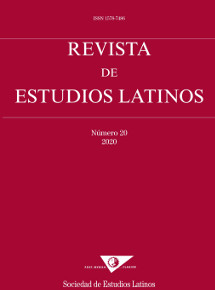The Congestorium artificiose memorie by Iohannes Host Romberch (Venetiis, 1520 y 1533): between scholasticism and humanism
DOI:
https://doi.org/10.23808/rel.v20i0.87202Keywords:
Host; Romberch; Congestorium; Artificiosa memoria; Reuchlin; Hoogstraten.Abstract
From the very title of the text (Congestorium) the idea has imposed itself that Romberch’s Congestorium artificiose memorie is no more than a complex ccumulation
of materials about memory, from which only the doctrine concerning loci deserves to be rescued, to a large extent, because it serves to explain the texts of other authors who preceded him, like Publicius, and, like Dolce, those who followed him in the long history of the art of memory. And these are precisely the points with which this work will be concerned: first of all, to outline the context in which the work was composed; second, to specify the actual meaning of the term Congestorium from the influence of the humanist Iohannes Reuchlin; and third, to consider to what extent the use of classical sources and the recognized authority of authors such as Publicius, Petrus Ravennas and Reuchlin allow us to catch some glimpses of a humanistic sensibility in Romberch, beyond his close relationship with the inquisitor of Cologne, Hoogstraten.
Downloads
Downloads
Published
How to Cite
Issue
Section
License
Copyright (c) 2020 Revista de Estudios Latinos

This work is licensed under a Creative Commons Attribution-NonCommercial-NoDerivatives 4.0 International License.
The originals published in the printed and electronic editions of this journal are the property of the Revista de Estudios Latinos and can be circulated as long as the original source and authorship is made clear in any reproduction, full or partial, of the same, and as long as this is not done for commercial purposes.






